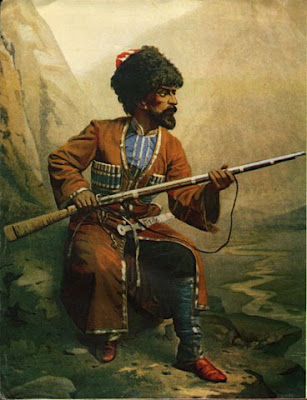
Yeah, two posts today. It's my birthday and I'm goofing off at work. Whatchoo gonna do about it?
But seriously, tomorrow is the Circassian Day of Mourning. The Circassians don't get much press--their neighbors the Chechens and Georgians, and their assorted disputes with Russia are the news of our day.
The Circassians are the native people of the Caucasus, they are warriors, they are mountain people, they are wild and independent and very very proud. (If you've ever met one, you're bound to know it.) They have to be this way because there are few of them left, and they are spread far and wide due to the Russians systematically devastating them for about a hundred years straight during the 1700s and 1800s. Most were forced to migrate to the Middle East or Turkey.
One of my best friends, a Circassian himself, posted this link which I thought was important to share. The text is below:
If we don't remember, and keep remembering, things like this, they are bound to happen again and again.May 21st is the Day of Mourning for the Circassian people. In 2009, this day will commemorate the 145th anniversary of the forced migration and dispersion of their grandfathers from their homeland and the imperilment of their existence.
The Russian-Caucasian war started in 1763 and lasted for more than 100 years. The Russian Czarist Army outnumbered the national Circassian resistance by more than 20 times!
The impact of the war on Circassians was horrendous. The Russian army aimed to terrorise the Circassians into submission. In addition to employing a lethal combination of numerical superiority and systematic reduction of resistance, a scorched earth policy resulted in wholesale destruction of villages and corps.
The Circassians suffered heavy losses in terms of human life, as much as 800,000 dead, and their country fell into ruin. Many tribes were completely wiped out and others came close to the edge of extinction.
Each stage of [Circassia’s] occupation was followed by the expulsion of the inhabitants of the area … [This resulted] in the elimination of the whole Caucasian nations and wiped out any memory of them … The war was conducted with ruthlessness. Circassian villages were torched by the hundred, crops were wasted. Those who surrendered were resettled in the plains… Pikman (1956,p79)
As early as 1818, Kabarda was at her knees. Four decades of open conflict had demoralised the people and left the land in ruins. By 1818, the number of Kabardians had fallen from 350,000 before the war to a mere 50,000 - in 1810 alone more than 200 villages were burnt in Kabarda.
The Shapsough, who numbered about 300,000 before the war, were almost completely extirpated. All the Ubykhs, numbering about 30,000, chose to immigrate rather than be resettled in the Kuban region. Some Abkhazian clans, like the Sadzians, were expelled wholesale. The Abazas, especially the Shkharawas, were also subjected to mass expulsion.
It was really the first intentional large-scale genocide of the modern times, as well as the model case of the consequent tradition of ethnic cleansing. It was also the largest single genocide of the 19th century. Anssi Kullberg, The Eurasian Politician - October 2003.
In 1864, the Ubykh made the last stand – but they were already doomed. Afterwards, Circassians were given the option of either leaving the high mountains and settle in the plains. Those who refused were given an ultimatum to leave for Ottoman lands or otherwise be considered prisoners of war. Covertly, the Russians pursued a policy of organised and systematic terror, where whole villages were pillaged and then burnt down to the ground, and thousands of people were killed in cold blood. These horrific acts, together with the collusion of the Ottomans resulted in mass exodus.
On May 21, 1864 Grand Duke Mikhail proclaimed the end of the Russian-Caucasian war.
Hundreds of thousands of hungry and disease-ridden Circassians and Abkhazians were herded to seaports wherefrom they were transported to vessels across the Black Sea to Turkish ports.
It is estimated that the number of North Caucasians who left for the Ottoman Empire between 1859 and 1881 to be at two million. Conditions were extremely bad and as many as 20% died of malnutrition and disease. Those who remained in the Caucasus, between 150 – 200 thousands, were compelled to resettle in the northern plains of the Caucasus were they were easier to control.
There are no words to describe the situation of the Mountaineers in those days. Thousands of them died in the roads, thousands of them died due to illness and hunger. The coastal regions were full with people who are dead or on the verge of dying. The babies who are searching for milk in their mother’s cold dead body, mothers who didn’t leave their kids from their laps even they are already dead from cold, and people who are dead while they got closer just to keep warm, are examples of the scenes that were normal in the coasts of the Black Sea. Y. Abramov, ”Caucasian Mountaineers”
Today over 4 million Circassians live outside Homeland in over 40 countries across of the world.
No comments:
Post a Comment